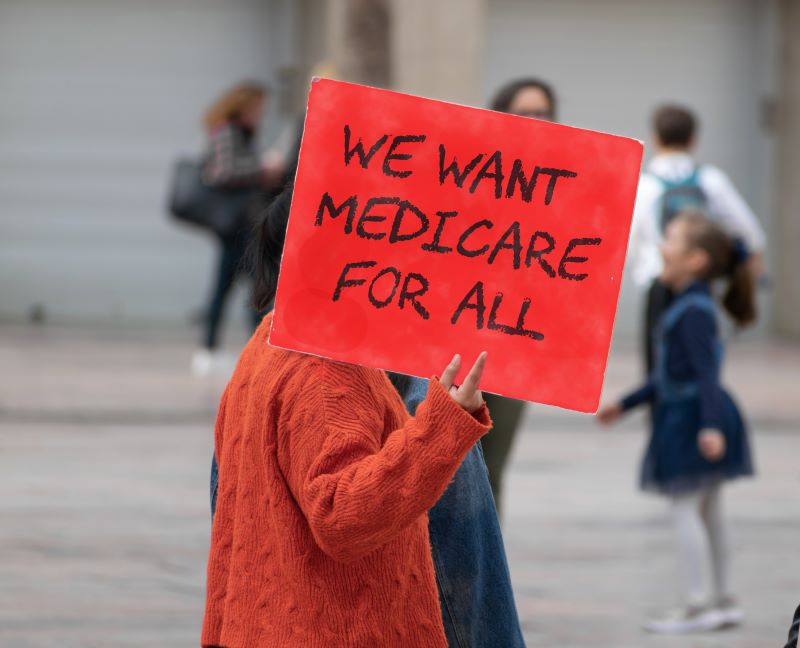What is Medicare for All?
Medicare for All is a single-payer healthcare system. The intent is for every U.S. resident to receive essential healthcare services that are covered by the government. There have been many public-funded healthcare bills introduced in Congress over the years, none quite as radical as the Medicare for All bills proposed by Senator Bernie Sanders and Representative Pramila Jayapal. From a cost and insurance point of view, their plans would change the entire healthcare system as we know it. They want comprehensive benefits – that means everything is covered. Primary care, prescription drugs, mental health, reproductive health, long-term services, dental, vision, and more are completely covered at no cost. There will be no premiums, no copays, and no deductibles. They want to eliminate the rising number of bankruptcies that result from medical debt, reduce the cost of medicine, and make healthcare a universal right.
Medicare for All is a controversial proposal. We’ll go over some of the major arguments for and against Medicare for All below.

Arguments For Medicare for All
Just from the brief description above, it’s not difficult to discern some of the glaring benefits Medicare for All would provide our country. You would no longer have to worry about paying monthly premiums, co-pays, or the like. There’s no deductible to meet before you get help paying for healthcare, and no surprise medical bills after services are rendered either. Since it eliminates networks as well, you’ll get a lot more provider options. Another prominent benefit is that easier access to healthcare will save more lives every year and help improve the overall health of our nation.
It’s not just individuals that benefit. Businesses will no longer have to worry about employee healthcare costs. That creates more money for higher wages or new hires. Medicare for All will also lower overall health care spending. There are a lot of administrative costs that can be reduced or eliminated with a single-payer system. It takes a lot of resources and time to bill multiple payers, especially when hospitals have to do so much work with private insurers on rates for each payer.
The majority of Medicare for All supporters don’t mind paying taxes towards a single-payer healthcare system. Especially if we’re not paying more than the premiums we pay now and we get ourselves and everyone else the healthcare they need without financial strain. Our country would also save money with Medicare for All based on how much we’re already spending on healthcare.

Arguments Against Medicare for All
The arguments against medicare are not that people shouldn’t have healthcare, and there is often empathy towards high medical bills. Instead, it’s about not believing the government can properly manage a Medicare for All healthcare system that actually produces savings, given their existing Medicare track record. That no country the size of the U.S. can do what Medicare for All is promising (limiting private insurance, controlling drug prices, and giving free healthcare to the entire population). Many people also fear that Medicare for All would actually limit access to healthcare and drive down the quality of healthcare received; and that their rights to seek coverage and care outside of the single-payer system will be stripped away.
So there are many questions about how the program will be funded and what financial burden that will cause for our country and individuals alike. Will the countries debt go up? Will individuals and businesses have to pay higher taxes? Will the doctors who care for us be paid less? There is also fear that the cuts Medicare for All will make to create savings will be in the way of fewer services and lower quality treatments. Essentially, those against Medicare for All want to pay for healthcare that meets their standards and not be locked into the Medicare for All system.

Interested in Learning More?
We know the above still leaves you with questions. Below are some resources that may provide you with more insight into Medicare for All and the arguments for and against it.
Bernie Sanders Medicare for All Plan
Jayapal Introduces Medicare for All Act of 2021
United States National Health Care Act (Wikipedia)
Fact Check: Medicare for All vs Public Options
Yale University Study on Medicare for All Savings
Economic Analysis of Medicare for All (study by PERI)
Economic Case Against Medicare for All (Cato Unbound – a debate journal)
The Costs of a National Single-Payer Healthcare System (Mercatus Center)












